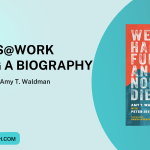The Six Traits of Great Writers
 Last February, Jessica Hagy published a brilliant visual story called, The Six Enemies of Greatness (and Happiness) (Forbes). In the introduction to her article, Hagy writes that these six factors, “can erode the grandest of plans and the noblest of intentions.” Wow—what six factors have the power to destroy both greatness and happiness? The enemies are surprisingly banal—and perhaps that’s why they are so insidious. We’re accustomed to these enemies. We do not think to fear them until it is nearly too late. Here they are:
Last February, Jessica Hagy published a brilliant visual story called, The Six Enemies of Greatness (and Happiness) (Forbes). In the introduction to her article, Hagy writes that these six factors, “can erode the grandest of plans and the noblest of intentions.” Wow—what six factors have the power to destroy both greatness and happiness? The enemies are surprisingly banal—and perhaps that’s why they are so insidious. We’re accustomed to these enemies. We do not think to fear them until it is nearly too late. Here they are:
- Availability
- Ignorance
- Committees
- Comfort
- Momentum
- Passivity
As a writer and writing coach, I know how deadly these enemies can be for writers. Fortunately, we can protect ourselves. Read on to find the six traits that will protect you from the deadly venom of each enemy.
1. Boundaries. In today’s world, with everything beeping and squawking at you and the experts pushing you to be social online and off, it’s easy to become so available to the world that the writing never gets done. Successful writers set boundaries around their writing time. You don’t need to be available by phone, email, or online until you have finished your daily writing. If you need to leave your cell phone in the garage or put an Internet lock on the computer (like Mac Freedom) to get writing done, then do it. The successful writer is simply not available until the work is done.
2. Learn. Plenty of writers create bad art out of ignorance—they have not taken the time to read great books. Great writers never reach the place where they know it all. Instead, they are constantly learning. They have read the great books in their genre. But they also read what the best writers in other genres are publishing. Go to plays, listen to music, view art, study life, and read as much as you can. Surround yourself with rich art, and you will create works of beauty.
3. Connect well. Great writers surround themselves with people who are smart, imaginative, and visionary. A few weeks ago Austin Kleon, author of Steal Like an Artist, spoke at Translator, a digital experience agency in Milwaukee. He encouraged us to build our idea incomes by connecting with brilliant people. (Say no to any committee meeting or connecting with duds and complainers.)
4. Stretch. For Hagy, dangerous habits emerge at the intersection of the “tried, tired, and true.” No kidding. For writers, our dangerous habits often show up as lazy writing. Let go of clichés and tired templates. Jump out of your comfort zone. Successful writers take on assignments that stretch their writing muscles. They take classes to learn how to write in a new genre. If you’re sinking into the boring comfort of the same old tired phrases, push yourself to make small changes. Write at a different time of day, in a new setting, or with a new tool—like your phone or iPad. Stretch those writing muscles and spark new ideas.
5. Momentum. Momentum can be a good thing—until it begins to feel like a rut. Think of a hamster on a wheel versus a runner on the open road. They both have momentum, but the hamster will never move forward or cover new ground. As professional writers, sometimes the work that fills up most of our time might be preventing us from doing our most brilliant work. Great writers take inventory every so often—to make sure they are moving forward. If you feel like you are spinning your wheels, write a vision statement about where you want your writing career to be in five years. Then take an honest look at what you are spending most of your time writing now. What do you need to give up and take on to reach your vision?
6. Engage and persist. Hagy warns readers about the dangers of passivity and encourages readers to trust the voice inside of them. Successful writers listen to their inner truth and live it. They are often so engaged with their writing that they don’t notice what’s happening in the world. Their eyes light up and their voices get animated when they speak about their work. And they persist at writing and trying to get their work published even when others think it’s stupid or crazy. If you want to be a successful writer, take work that interests and excites you. Do something worth talking about at the end of the day or writing about tomorrow. And then don’t give up when the first gatekeeper says no. Keep at it.
Your turn. My list of traits was inspired by Jessica Hagy’s list of the enemies of greatness. What traits do you associate with great writers? Leave a comment below!















Dedication is the big one for me. It’s insanely easy to be distracted by everything else to the point that writing doesn’t get done. But at the end of the day, as much as I enjoy watching the first four seasons of The West Wing over and over, I’ll enjoy it more when I’ve got the pages I need done.
Love it. Thank you. And you bring up another helpful tool: reward!
My biggest problem is momentum. I definitely have to work on that one! As soon as I get myself rolling in a great and new direction, I end up getting caught back up in the little projects that have no chance to move forward in.
I get these plans all set out for my new projects (or great things to grow my blog further) and once I start it, I always end up giving in to a low paying project for somebody because I am afraid to say no to people. Then my great project slows down until I get back into my groove. I say no to my kids so easily, I am not sure why I can’t say no to a low paying project that will hold me back with no chance to better my path!!
I will definitely work on it, reading this post made me more aware of what I have been doing. Thank you!
I look forward to hearing how it goes–and what you discover that helps you to say no! I think all writers struggle to prioritize projects. One of my favorite tools is Cheryl Richardson’s Absolute Yes list–she asks clients to choose 5 things they will always say yes to. Everything else gets a no. She talks about this in her book, Take Time for Your Life. Sometimes I think about doing a list like that for writing projects.